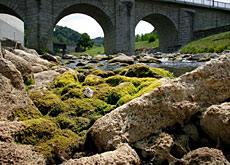
Heatwave prompts cool response from government

The government has said it will not press for tighter environmental regulations in the wake of last summer’s heatwave which saw tens of thousands of fish die.
A report published on Monday stated that there was no need for immediate action even though similar weather extremes could be expected in the future.
The study, compiled by the Swiss environment agency and the Federal Office for Water and Geology, examined the consequences of last summer’s record temperatures. Météosuisse, a national weather service, contributed to the report.
It noted that glaciers melted significantly, receding four times as much as in previous years, which lead to greater flows into alpine rivers.
But a lack of rain over the summer caused at least 350 rivers stretching over a total of 245 kilometres to dry out. Wetland ecosystems also suffered.
Many smaller rivers in western Switzerland and canton Ticino in the south have yet to recover.
Fish stocks depleted
In lower-lying areas reduced flows and rising water temperatures endangered fish.
Water temperatures hit 26 degrees Celsius along some areas of the Rhine. But, generally, the falling water levels did more damage, said the report.
Grayling and trout were especially hit hard, with 50,000 dead grayling washing up downstream from Lake Constance in August.
In total, about 85,000 dead fish were recovered but real losses were “undoubtedly much higher”, said officials.
Federal authorities added that interventionary measures had helped to sustain water levels and avert a crisis in water quality.
Successful measures
In many cantons, fish protection services worked to save fish stocks and to decrease the stress caused by high water temperatures. At least 12,000 fish were transferred from sections of rivers where flow was insufficient.
Irrigation was limited or prohibited in some of the driest areas.
Having reviewed the report, Philippe Roch, director of the environment agency, said on Monday that it would not be necessary to tighten federal regulations governing water usage and environmental protection “in the immediate future”.
But he stressed that because of the effects of climate change, all efforts should be made to limit greenhouse gas and CO2 emissions according to the Kyoto Protocol.
swissinfo, Elizabeth Meen
Melting glaciers meant higher flows in alpine rivers.
However in the Jura and central areas low river levels threatened fish stocks.
The need for irrigation conflicted with the need to protect aquatic environments.
Drinking water quality was not impaired.
Swiss authorities say tighter environmental regulations are not needed.

In compliance with the JTI standards
More: SWI swissinfo.ch certified by the Journalism Trust Initiative

























You can find an overview of ongoing debates with our journalists here . Please join us!
If you want to start a conversation about a topic raised in this article or want to report factual errors, email us at english@swissinfo.ch.